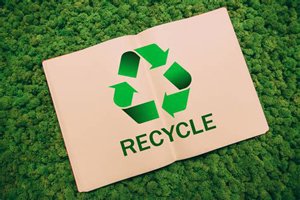Many complain that recycling at home is complex and requires too much effort. It calls for just some organizational skills and the knowledge of sorting one's trash. How so?
Start by consciously reducing your waste. First, rethink what you buy/consume. Then reduce buying items that cannot be recycled. Repurpose and reuse what you can. And send what can be recycled to the appropriate places. Create a space for the different recyclables by assigning different bins for the trash: plastic, metal, paper and cardboard, glass, compost, etc. And when you want to throw something away, just place it in the appropriate container. For instance, I use a large shipping carton as my paper and cardboard bin. When it's all used up and torn from humidity or the cats, I send it to the recycling center and get myself another one from a pharmaceutical company to be used for the next year.
Let's get practical: plastic bags and soft plastics cannot be recycled. Most machines cannot process them. What can you do in this instance? Take your tote bag to the grocery store or the supermarket. Avoid drinking in plastic cups. If you can poke your finger through the plastic, it is considered too soft and doesn't belong in your plastic bin. The lid of a bottle is usually too small: either keep it attached to the bottle or gallon or place it inside the said plastic item that is going to the recycling facility.
Metal cans cannot always be sent for recycling. Some have an insulated coating and this hinders the recycling process. When you have doubts, throw the item out in the regular trash bag. Remember to remove any paper or plastic labels. It is not necessary to thoroughly wash recyclables. But they need to be void of any food or residue and should be dry to avoid contaminating other items.
When it comes to paper and all other by-products, one can never think of the following enough: do you know how many trees have to be cut for a single white sheet of paper? We consume a lot of paper and paper products and it's important to recycle them to save trees, even if they are planted to make paper, and also natural resources like water, electricity, and/or fuel. Beware of magazines that have glossy prints. They cannot be recycled with the paper since those shiny or laminated pages can be made of vinyl or plastic-based.
Glass comes in different colors. And not all centers can recycle or treat colored glass. Some facilities clean the glass to be re-used. Some people upcycle empty glass bottles. We will look into this in a different post. Make sure you separate the transparent glass bottles or containers from the other glass colors. This means you basically need 2 different large cartons or bins, and when they get full, you can drive to the nearest recycling hub and drop them off. Bear in mind that with so many different bins, you need to manage your space well. An option would be to place the cartons that are not needed daily in your basement, a balcony, or even the garden.
Organic matter can be composted. This is the process of natural disintegration that creates fertilizer to enrich the soil of your plants and trees. It is a lengthy process but it is not as complicated as it sounds. For more details on how you can compost your organic leftovers, read my post here. My trials have so far fared well. I just make sure to avoid adding anything stinky to them, like onions, or animal remains. And being a vegetarian, it works well. You can be a carnivore and still compost your veggie rests. Just feed the street cats and dogs the animal leftovers and your compost will turn out good.
After doing all of the above, you will notice that you would still have some waste. It could be electronics. Clothing. Oils. And many others. Some countries have industries for such items. Not all do. Electronics and clothing can be donated, in some cases refurbished. These items release heavy metals and toxic substances such as mercury, arsenic, lead, cadmium, and beryllium. Oils should never be poured into the grounds, as they are hazardous to both humans and the environment. That is why, when you want to avoid harming the environment, do not contaminate the soil, the air, or the fauna/flora. When unsure what to do, just ask your community/municipality or even reach out to NGOs specialized in such matters.
Happy recycling 🌱♻️🌱

